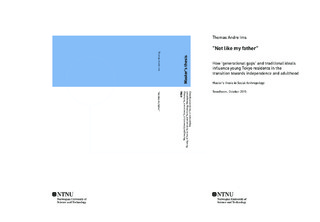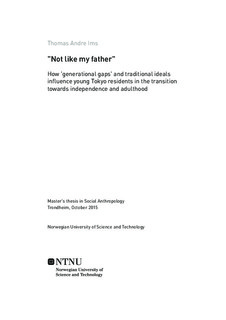| dc.description.abstract | This thesis is about the life-course progression towards adulthood in Tokyo, Japan, as my informants experience it during their transition from higher education towards and into employment. It is based on a seven months’ fieldwork in 2014 and a revisit for one month in 2015, carried out by participating and observing in multiple social circles. As there is a strong narrative surrounding generation gaps in Japan, the context of the thesis is placed in my informants “struggles” facing ideals and values of a past they do not find connected with their present. The key/core-informants was in their 20s and early 30s on different points of this transition, and it is their conceptualization and understanding of adulthood and how they experience the generation gap that is used as the foundation to explore their progression towards adulthood.
On one side of the generation gap in Japan the elders, my informants parent’s generation and grandparent’s generation, color the young generations as weak, spoiled and “less-Japanese” than themselves. On my informant’s side, the elders are called “stiff”, “outdated” and “lacking a sense of joy”. I will present through exploring my informants thoughts and reasoning as they progress through life, both as they reflect over the past, present and future, how they distance themselves from the image of their parents and the lifestyle of their elders. With statements such as “I don’t want to become an adult” and “I don’t want to become like my father” they express how they distance themselves from how society worked. However by adding “I fear I will end up like my father” they also present it as something that might not be avoidable and saying that society still might in effect work the same way as it did for their parents.
This thesis explores how my informant’s image of adulthood and society came to be through family and school education, and how they later apply strategies to alter or renegotiate the way one becomes independent. Thus, in turn what adulthood will be for them and how it will be “gained” in order to avoid the “life of their parent’s generation”. | nb_NO |

